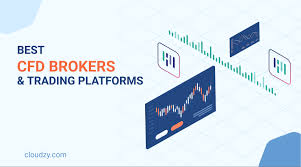
The Best CFD Book for Beginners
Entering the world of trading can be daunting, especially when it comes to complex instruments like Contracts for Difference (CFDs). A robust foundation is crucial, and reading the right book can provide you with the knowledge needed to navigate this dynamic market. One of the best resources available is a high-quality CFD book for beginners. A well-written book can demystify the complexities of CFDs, provide practical strategies, and equip you with essential knowledge to make informed trading decisions. For fantastic resources on CFDs, you can explore best cfd book for beginners bestbrokercfd.com, a platform that offers valuable insights into the best practices in trading CFDs.
Understanding CFDs
Before delving into the best books for beginners, it’s essential to grasp what CFDs are. Contracts for Difference allow traders to speculate on the price movements of assets without owning them. This trading mechanism enables significant leverage, which can amplify both potential profits and risks. Understanding the mechanics of CFDs, including how leverage works, margin requirements, and risk management is critical for any beginner.
Why Reading is Important for Beginners
Many beginners fall into the trap of relying solely on online tutorials or trading platforms without understanding the underlying concepts of trading. Books offer structured learning and comprehensive insights that most online resources cannot match. They often dive deep into topics, providing context that helps you understand market behavior and trading strategies. Investing time in reading is essential for developing a well-rounded trading strategy.
Top Recommended CFD Books for Beginners
Here’s a curated list of some of the best CFD books for beginners that can help you kickstart your trading education:
1. “CFD Trading: A Beginner’s Guide” by David Smith
This book lays a strong foundation for beginners by explaining critical concepts in simple terms. It covers everything from the basic definitions of CFDs to risk management strategies and chart analysis. David Smith’s writing style is approachable, making it an easy read for newcomers.
2. “The Complete Guide to CFDs” by John Doe

This book is an extensive resource that goes beyond the basics. It includes detailed analyses of various strategies, margin trading, and how to create a personalized trading plan. John Doe provides real-world examples that make complex theories relatable.
3. “CFD Trading Made Simple” by Mary Jones
In this book, Mary Jones simplifies advanced concepts and provides practical strategies for successful trading. It’s an excellent resource for those who want to cut through the jargon and focus on actionable insights. The book also highlights common pitfalls to avoid as a beginner.
4. “Trading CFDs: A Guide to Success” by Peter Brown
Peter Brown’s book focuses not just on the mechanics of CFD trading, but also on the psychology behind trading. Understanding your mindset is crucial in trading, and this book provides strategies to enhance mental resilience and emotional control.
5. “The Forex and CFDs Trader’s Handbook” by Andrew Peters
This handbook is ideal for those looking to broaden their trading skills beyond CFDs. While it covers Forex comprehensively, it also thoroughly explains how CFDs relate to currency trading, making it a versatile addition to your reading list.
Key Concepts to Look for in CFD Books
When choosing a CFD book, consider the following key concepts that should be covered:
- Understanding CFDs: A clear explanation of what CFDs are and how they function.
- Risk Management: Techniques to manage your risk effectively to protect your capital.
- Market Analysis: Both fundamental and technical analysis methods that will help you make informed trading decisions.
- Trading Psychology: Insights into the emotional aspects of trading and how to maintain discipline.
- Strategy Development: Practical strategies tailored to beginners that can be applied in real markets.
Conclusion
Choosing the right CFD book can significantly impact your learning curve and success as a trader. Start with the recommended titles, and gradually expand your knowledge as you gain more experience. The journey into CFD trading requires patience, and a strong educational foundation will serve you well in the long run. Remember that trading is not just about making money; it’s about developing a strategy and mindset that allows you to navigate the often turbulent waters of financial markets. Happy reading and trading!
